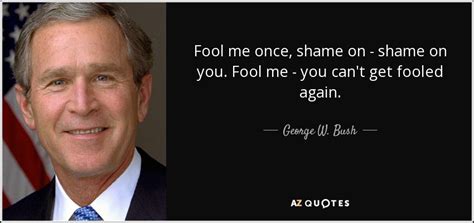When it comes to memorable quotes, few can match the impact of George W. Bush's "Fool me once, shame on... shame on you. Fool me—you can't get fooled again!" statement. Made during a 2002 speech in Nashville, Tennessee, this quote has become a symbol of the Bush presidency and a subject of much debate. But what exactly did Bush mean by these words, and why have they become so infamous?
At its core, the quote is a play on a common English proverb: "Fool me once, shame on you; fool me twice, shame on me." This saying implies that if someone deceives or tricks you once, it's their fault, but if they manage to do it again, then you're to blame for not being more careful. Bush's version, however, is slightly different, as he seems to be saying that if you're fooled once, you can't be fooled again. But what does this really mean?
Understanding the Context
To grasp the full context of Bush's quote, it's essential to look at the circumstances surrounding his speech. At the time, the United States was still reeling from the aftermath of the 9/11 attacks, and the Bush administration was facing intense scrutiny over its handling of the situation. As a result, Bush was under pressure to reassure the public that his government was doing everything in its power to prevent similar attacks from happening in the future.

It's within this context that Bush's quote can be seen as an attempt to convey a sense of determination and resolve. By saying that you can't get fooled again, he was implying that his administration had learned from past mistakes and was now better equipped to deal with future challenges.
Breaking Down the Quote
However, the quote itself is somewhat ambiguous, which has led to numerous interpretations over the years. Here are a few possible breakdowns of what Bush might have meant:
- A statement of intent: One way to look at the quote is as a statement of intent from the Bush administration. By saying that you can't get fooled again, Bush was signaling that his government was committed to taking bold action to prevent future attacks.
- A reflection of confidence: Another interpretation is that the quote reflects Bush's confidence in his administration's ability to handle future challenges. By saying that you can't get fooled again, he was implying that his team had learned from past mistakes and was now better equipped to deal with unexpected situations.
- A warning to others: A more cynical interpretation is that the quote was a warning to others, particularly those who might be considering attacking the United States. By saying that you can't get fooled again, Bush was signaling that his administration would not tolerate any further attacks and would take swift action against anyone who dared to try.
Legacy of the Quote
Regardless of what Bush meant by his quote, it's clear that it has become a defining symbol of his presidency. The phrase has been widely ridiculed and parodied over the years, with many seeing it as a symbol of Bush's perceived lack of intelligence or sophistication.

However, it's also worth noting that the quote has been the subject of much debate and analysis over the years. Some have argued that it reflects a deeper truth about the nature of leadership and decision-making, while others have seen it as a symbol of the Bush administration's flaws and weaknesses.
Impact on Politics and Culture
The quote has also had a significant impact on politics and culture, with many referencing it in discussions about leadership, decision-making, and the nature of truth. It's been used in everything from comedy sketches to academic papers, and continues to be a source of fascination for many.
- Influence on comedy and satire: The quote has been widely used in comedy and satire, with many comedians and writers referencing it in their work. It's become a symbol of Bush's perceived lack of intelligence or sophistication, and is often used to poke fun at his presidency.
- Impact on academic discourse: The quote has also been the subject of much debate and analysis in academic circles, with many scholars examining its implications for our understanding of leadership and decision-making. Some have argued that it reflects a deeper truth about the nature of power and politics, while others have seen it as a symbol of the Bush administration's flaws and weaknesses.
- Cultural significance: The quote has become a cultural touchstone, symbolizing the complexities and challenges of leadership in the modern world. It's a reminder that even the most powerful leaders can make mistakes, and that the consequences of those mistakes can be far-reaching and devastating.






In conclusion, George W. Bush's "Fool me once, shame on... shame on you. Fool me—you can't get fooled again!" quote has become a defining symbol of his presidency, and its legacy continues to be felt in politics and culture today. Whether seen as a statement of intent, a reflection of confidence, or a warning to others, the quote remains a powerful reminder of the complexities and challenges of leadership in the modern world.
What did George W. Bush mean by his "Fool me once" quote?
+Bush's quote is somewhat ambiguous, but it can be interpreted as a statement of intent, a reflection of confidence, or a warning to others.
What was the context surrounding Bush's quote?
+Bush made the quote during a 2002 speech in Nashville, Tennessee, at a time when the United States was still reeling from the aftermath of the 9/11 attacks.
What impact has the quote had on politics and culture?
+The quote has been widely referenced in comedy and satire, and has been the subject of much debate and analysis in academic circles. It's become a cultural touchstone, symbolizing the complexities and challenges of leadership in the modern world.
